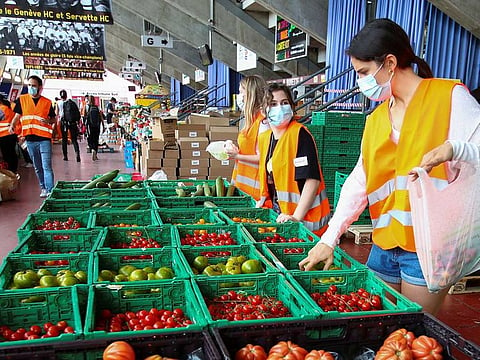Has COVID-19 resulted in hate and xenophobia?
UN chief Guterres calls for people to treat each other with dignity and spread kindness

Dubai: Has the coronavirus, and the lockdown that has been in place to help fight it, resulted in an outpouring of hate and discord around the world?
UN Secretary-General Antonio Guterres on Friday called for an "all-out effort" to end the "tsunami of hate and xenophobia" sparked by the pandemic, without naming specific countries.
"The pandemic continues to unleash a tsunami of hate and xenophobia, scapegoating and scaremongering," Guterres said in a statement. "Anti-foreigner sentiment has surged online and in the streets. Anti-Semitic conspiracy theories have spread and COVID-19-related anti-Muslim attacks have occurred."
According to Guterres, migrants and refugees have been "vilified as a source of the virus - and then denied access to medical treatment."
Meanwhile, "contemptible memes have emerged suggesting" that older people, some of the most vulnerable to the virus, "are also the most expendable," he said.
"And I ask everyone, everywhere, to stand up against hate, treat each other with dignity and take every opportunity to spread kindness," Guterres said.
More than 3.89 million people have been reported to be infected by the novel coronavirus globally and 269,937 have died, according to a Reuters tally. Infections have been reported in more than 210 countries and territories since the first cases were identified in China in December 2019.
Coronavirus could ‘smoulder’ in Africa
The coronavirus could "smoulder'' in Africa for years and take a high death toll across the continent, the World Health Organization has warned.
More than 52,000 confirmed infections and 2,074 virus-related deaths have been reported by African countries, according to figures released Friday by the Africa Centres for Disease Control and Prevention. The total number of cases has risen by more than 42% in the past week.
The disease appears to be spreading more slowly across Africa than in Europe, according to the WHO report.
Hong Kong gyms, bars and cinemas reopen
Hong Kong began to ease major social distancing measures with bars, gyms, beauty parlours and cinemas reopening their doors. Queues formed outside gyms in the semi-autonomous Chinese city on Friday morning for employees to check temperatures as people celebrated the return of some normalcy to the city, AFP reported.
Australia plans to lift most restrictions by July
Australia's government unveiled a three-stage plan to get the economy back to a new "COVID-safe" normal by the end of July.
Federal authorities have left details of the plan's implementation up to the country's diverse states and territories, meaning coronavirus restrictions will remain in place for weeks or months longer in areas hardest hit by the disease.
Saliva-based test in US
US health regulators approved the first saliva-based coronavirus test that allows people to collect their own sample at home, AP reported.
The new at-home option is expected to expand use of the test developed by Rutgers University, which the Food and Drug Administration first authorised last month. People can use the plastic tube at home to provide a saliva sample and ship it to a laboratory for processing. Initially, the government limited the test to health care facilities and testing sites with professional supervision.
Lockdown in Brazil
Brazil's fifth largest city, Fortaleza, became the nation's third metropolis to enter lockdown for COVID-19.
The capital of northeastern Ceara state adopted more intense restrictions for pedestrians and car traffic, including police roadblocks, and allows only essential services, AP reported.
This week, Maranhao and Para states imposed a lockdown in their capitals, Sao Luis and Belem. Brazil's President Jair Bolsonaro went to the Supreme Court on Thursday to ask that states be forced to roll back restrictive measures, despite the surge in the nation's cases and deaths.
Fortaleza has 727 deaths from COVID-19. Local authorities in the city of 2.7 million residents project 4,000 deaths by the end of May.
Spain working on rollback measures
Spain's government is deliberating which regions can rollback lockdown measures next week. The regional authorities of Madrid, hardest hit by the coronavirus, are pushing the government to allow them to loosen restrictions. However, that position appears to have led to the resignation of its regional director of public health on Thursday.
Madrid leads Spain with 8,500 confirmed deaths from the virus that has killed more than 26,000. Officials in Catalonia, the second-hardest hit area, have said they are not prepared to move forward with the rollback.
Spain reported 221 deaths on Friday, down from daily totals of more than 900 deaths a month ago.
Italian province to reopen stores
The northern Italian province of Bolzano is reopening stores this weekend in defiance of the Rome government's programme, citing a special statute that grants it some autonomy.
According to the statute signed Friday, stores may reopen on Saturday, ahead of the official May 18 opening date nationally. That will be followed Monday by the reopening of bars, restaurants, hairdressers and museums, which are not slated to open until June 1.
Who is responsible?
Austrian Chancellor Sebastian Kurz says there's no sense in engaging in a ``blame game'' about who was responsible for the spread of the coronavirus. Kurz was asked Friday whether the Austrian government will apologise to other countries for what happened in ski resorts such as Ischgl, where tourists were infected and carried the virus as far away as Iceland and Norway.
Kurz said that Austria responded earlier than other countries to the pandemic.
South Korea school plans could be delayed
South Korea's top infectious disease expert says the country could possibly push back plans to reopen schools if coronavirus infections surge again over the weekend after a weeks-long decline. A slowing caseload in previous weeks had allowed officials to relax social distancing guidelines and schedule a reopening of schools, starting with high school seniors on May 13.
- with inputs from agencies









